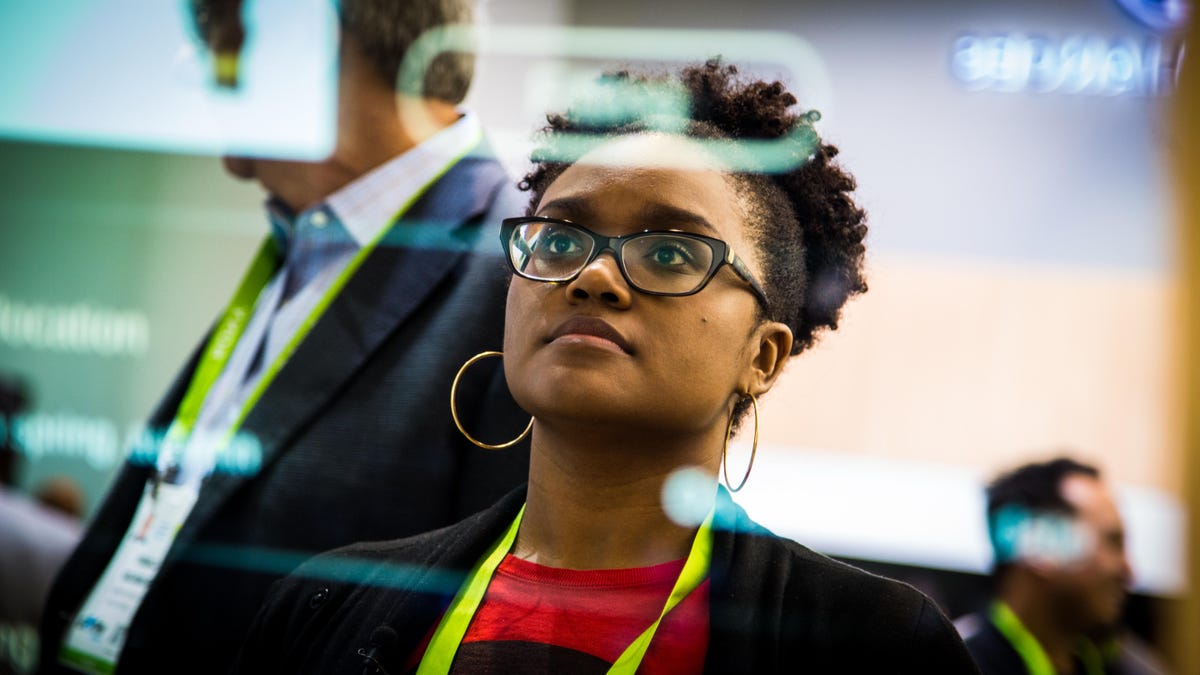Beauty tech lives at the intersection of self-care and self-loathing
A flotilla of devices at CES 2018 use technology to help you look better. But after trying a few of these out, I just felt worse about my looks.

I spent hours looking into smart mirrors at this year's CES. I didn't like everything I saw.
Devices with a focus on beauty made a large, pedicured footprint at this year's CES tech show in Las Vegas. They typically combined a Wi-Fi connection, built-in cameras, machine learning and a dash of augmented reality to analyze various aspects of your appearance -- and make recommendations about what products you need to look better.
TL;DR: Companies want to use technology to judge the hell out of you, make you feel bad and sell you beauty products.
The HiMirror Mini judged the dark circles under my eyes and hurt my feelings.
At least, that's how I felt by the time I made my way to a luxe suite that had been transformed into a pop-up beauty salon. A company called Henkel Beauty Care invited me to try its Schwarzkopf Professional SalonLab, a system in which a handheld, Bluetooth-connected device analyzes your strands. The device sends the info to an app that gives your hair an overall score and a moisture ranking. That app creates a custom shampoo for what it thinks you need, then sends that info to a machine that makes a sample of that shampoo on the spot.
Many devices had given their opinion of my appearance by the time I reached the Henkel suite. The HiMirror Mini, an internet-connected mirror with Amazon Alexa built in, told me I needed help with the dark circles under my eyes. The Neutrogena Skin360 Skin Scanner, an iPhone camera attachment that takes up-close pics of your pores, said my skin was too dry. Let's just say my self-esteem was at a low ebb.
Beauty products, including the technology we saw at CES, lie at a weird intersection of self-care and self-loathing. It's what makes going to beauty stores like Sephora or Ulta a unique experience -- the sales associates find a way to convince you that you have a perfect complexion, yet you walk out of the store with $200 worth of products.
But salespeople at the beauty counter appeal to your ego; the beauty devices here in Vegas appeal to your insecurities. Technology doesn't care that 16-hour work days at one of the world's largest tech shows gave me dark circles under my eyes. It doesn't take into account that the Nevada air has dried out my skin despite the gobs of moisturizer I used throughout the week. Artificial intelligence took a cold, hard look at my face, analyzed what it saw and spat out recommendations, context be damned.
So when I sat on a white leather stool in a converted hotel suite for my hair analysis, I was at pretty vulnerable place with my self-esteem.
But the hair analyzer was different than the mirrors that had judged me so harshly before -- it requires a human, therefore empathetic, touch. The Schwarzkopf system is a salon-only offering, so a stylist is there to help translate your results. Kim Vo, a Schwarzkopf ambassador and stylist, explained the process as he clamped the analyzer over the roots and ends of my hair. He complimented my curls while we waited for the app to figure out what was going on inside my hair. And when the app said my hair was dry, Vo talked me off the cliff by pointing out that my overall hair health score was in the 70s, which was pretty good.
Even though the news about my hair was bad, having a real person by my side made it a little better. Tech companies need to figure out how to bring the empathetic feedback of a person into their connected beauty products. Keep the mirror that just says I have dark spots and dry skin -- give me the one that will add a compliment to that assessment.
How PCs and phones are converging: New computers at CES 2018 are embracing the best phone features.
CES 2018: CNET's complete coverage of tech's biggest show.

